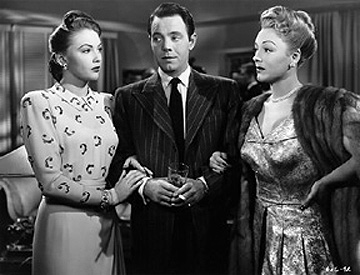There was no way for me to resist Repeat Performance. It’s a 1947 film noir with a time loop, a concept so relevant to my interests that it’s frankly ridiculous I didn’t find out about it until now.
The film begins with a murder. The distressed Sheila (Joan Leslie) has just shot her husband, the feckless and straying Barney (Louis Hayward). She flees her apartment seconds ahead of discovery, trying to seek refuge–and some sort of mental anchor–with her friends in the theater world (Sheila is an actress, Barney is–was–a playwright). It’s New Year’s Eve, right when the old year is tipping over into the new, and then it’s New Year’s Day, right as the drunken jubilation is beginning to fade into sleepiness and concerns about getting home. Sheila no longer has anywhere to go, but last year, she thinks, she did. If she could only live the year over again, she could avert all the tiny wrongs that would snowball into Barney being dead on her living room floor.
She gets her wish.
Repeat Performance doesn’t live up to its premise, but it doesn’t go so far as to squander it either. It’s a dreamy, slightly off-kilter take, and it gains most of its power from its strangeness, especially its bitter fatalism. And, perhaps most importantly, it has a killer ending.
Sheila enters the past with a few concrete goals. She wants to keep Barney from ever meeting rising star playwright Paula Costello (Virginia Field), the woman he will have an affair with, and she wants to keep her poet friend William Williams (Richard Basehart) from being institutionalized after he accepts a wealthy woman’s toxic patronage. It should be easy, but it’s not. To borrow a phrase from Stephen King’s 11/22/63, Sheila soon discovers that “the past is obdurate.” The timeline isn’t at her mercy–it’s fighting back, resisting whatever she throws at it. She can change things, and some of them seem like they should be enough to avert disaster, but that fatal New Year’s Eve still looms ahead of her.
In a way, Sheila’s struggle feels like a bleak commentary on what we can and can’t do for others. With or without her intervention, Barney is a drunken, seething, philandering wreck: she can try to keep him from opportunities to philander, and she can ask him not to drink, but he’s going to circumvent and ignore her. And nothing she can do is going to stop his professional jealousy and his anger at her, because she never really caused them in the first place. She can try to protect sweetheart William–she even directly warns him–but can she make him believe her predictions enough to reject what seems like a major opportunity? Could anyone? The biggest change Sheila manages it arguably one that makes things worse, and that’s the truest sign that this is noir. It’s easy for things to go downhill; it’s where they’re all going anyway.
Repeat Performance is streaming on the Criterion Channel.

